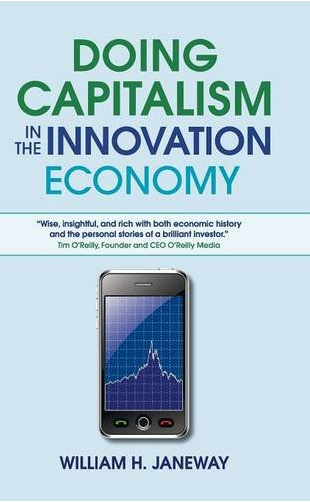
Steps on the Path to “Doing Capitalism”: Archived Writings
The articles archived here represent successive if haphazard steps in the formulation of the theoretical perspective and historical understanding presented in my book, Doing Capitalism in the Innovation Economy: Markets, Speculation and the State. Thus, their subjects span a broad spectrum: from the manic financing of frontier technology to the complex game played between the financial markets and financially stressed governments by way of the internal dynamics of great waves of technological innovation. I have provided a brief introduction to each of them in order to indicate both the context in which they were composed and the basis of their continuing relevance.
Financing the Future (1982)
This, the earliest of the archived writings, is the text of a talk given in 1982 at a Colloquium on Artificial Intelligence, jointly sponsored by MIT’s AI Lab and the Wall Street firm of F. Eberstadt & Co. Inc., of which I was then a partner. Its reflections on the manner in which innovative technologies both become candidates for speculative valuation and are themselves dependent on such speculative funding is a central theme of my book. Those reflections are all the more relevant today, when new and promising techniques of Machine Learning are generating both practical demonstrations and fevered anticipation of the renewed promise of Artificial Intelligence.
The Economic Significance of Equity Capital: Lessons from Venture Capital Investing (1991)
By 1991, the date of this talk, I had established a close and enormously rewarding intellectual relationship with Hyman Minsky, a post-Keynesian economist marginalized by the discipline until the Global Financial Crisis demonstrated the relevance of his work (as discussed at length in chapter 8 of my book). The talk challenged the orthodox theory of corporate finance as formulated by Merton Miller and Franco Modigliani, which asserts that the value of the enterprise is independent of the composition of the right hand side of the balance sheet, the relative quantities of debt and equity. It emphasized how critical is the assumption of liquidity in securities markets and how economically damaging is its endogenous disappearance under stress, a lesson learned at systemic scale in 2008.
The 1931 Sterling Crisis and the Independence of the Bank of England (1996)
This article was published in the Journal of Post-Keynesian Economics as a contribution to a symposium on the question: Is an Independent Central Bank Necessary or Desirable? It directly derives from my Cambridge Ph.D. thesis on The Economic Policies of the Labour Government, 1929–1931, work which permanently drove my interest in the problematic and contested frontier between the functioning of two, necessarily overlapping sets of institutions: the market economy and the political process. The opportunity to reflect on the international financial crisis that destroyed the Labour Government in 1931 led me (albeit implicitly) to revise the conclusion of my thesis in one important respect. The Bank of England did not play an independent role in enforcing austerity on the Government. On the contrary, its drive to escape from merely serving as the manager of the massive national debts incurred in waging World War I led it to become the slave of the international financial markets which it had once ruled in the halcyon days of the pre-War Gold Standard. Written when the independent central bank was being celebrated as the one legitimate state institution in the neoliberal regime, today it provides a relevant perspective on a world whose “global financial imbalances” remain unresolved a decade after they culminated in the most extreme crisis since 1931.
Technology and the Rest of Culture (1997)
This brief text represents my contribution to a symposium organized by the journal Social Research at New School University on the subject “Technology and the Rest of Culture.” Writing as the great IT Bubble of the late 1990s was gathering steam, I began by noting the extreme contrast between the ruthlessly meritocratic culture of Silicon Valley and a national culture that, uniquely in the developed world, celebrated belief in a personal god by a majority of its citizens. But my overriding purpose was to identify the challenge of valuing innovative technology in financial terms and the false promise that technology itself could provide an effective response. Both the challenge and that false promise are ever with us.
The Fifth Great Wave is Breaking Now (2003)
This article was written for the Spectator, a British magazine for which I had written regularly as a graduate student at Cambridge at the end of the 1960s. Its argument that the bursting of the Tech Bubble only marked the end of the first half of the Digital Revolution, the fifth great wave of technological innovation, is confirmed by the accelerating digitalization of life — economic, social, cultural, political — that we observe today.

